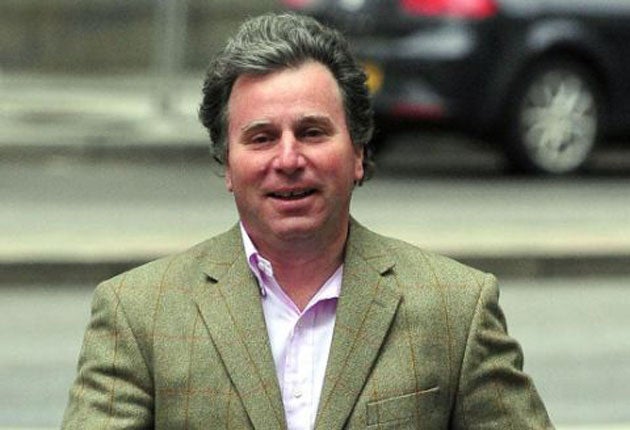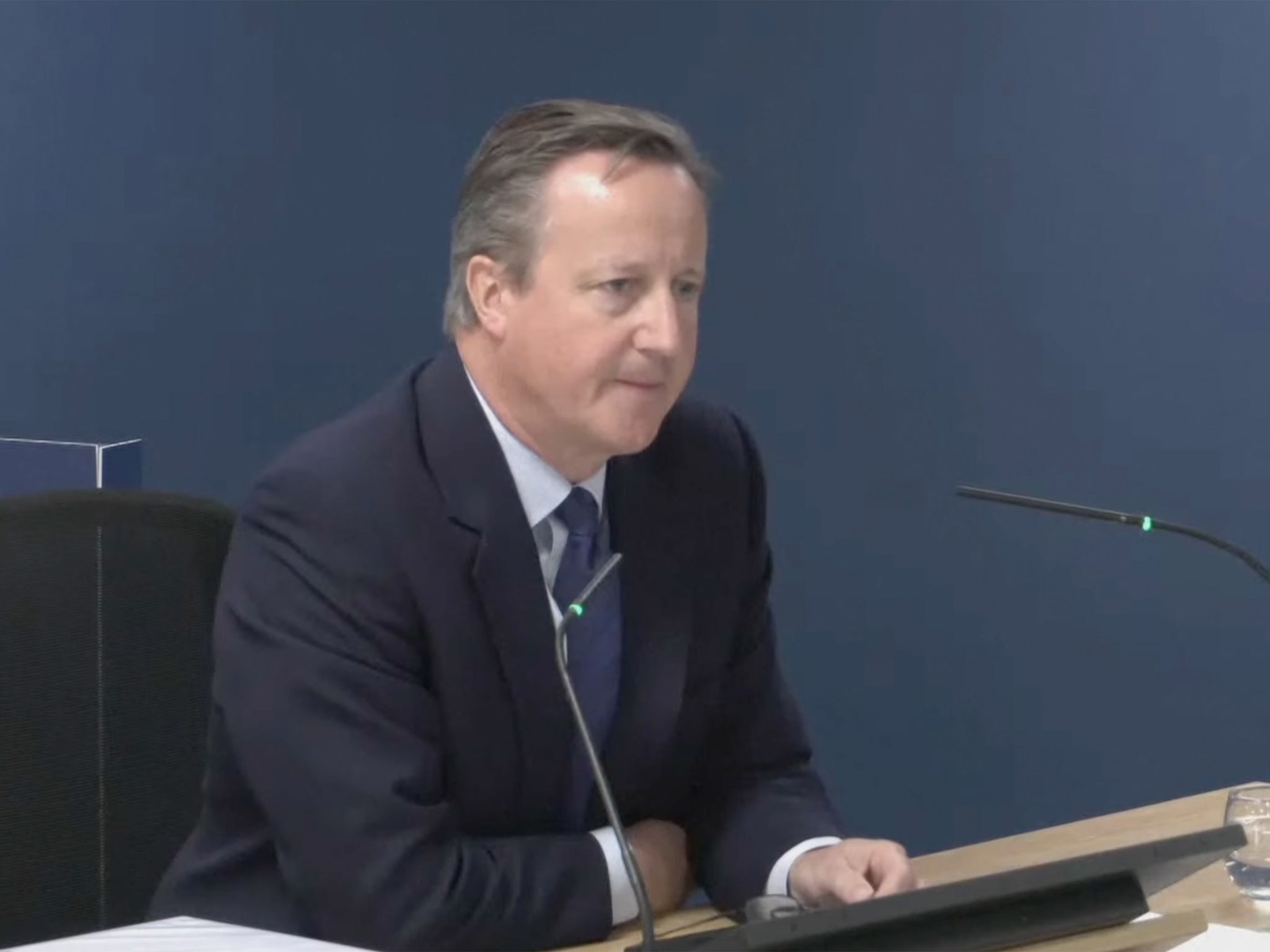Covid inquiry – live: George Osborne claims austerity had ‘positive’ effect on UK’s ability to withstand Covid
George Osborne is giving evidence to the Covid inquiry today
Your support helps us to tell the story
My recent work focusing on Latino voters in Arizona has shown me how crucial independent journalism is in giving voice to underrepresented communities.
Your support is what allows us to tell these stories, bringing attention to the issues that are often overlooked. Without your contributions, these voices might not be heard.
Every dollar you give helps us continue to shine a light on these critical issues in the run up to the election and beyond

Eric Garcia
Washington Bureau Chief
Austerity had a “positive” effect on the UK’s ability to withstand the Covid-19 pandemic, former chancellor George Osborne has claimed.
In his witness statement submitted to the Covid inquiry, Mr Osborne said austerity had a positive effect because it meant public finances recovered.
“Reducing the deficit and placing debt as a percentage of GDP on a downward path was also essential to rebuild fiscal space to provide scope to respond to future economic shocks,” Mr Osborne said.
“I have no doubt that taking those steps to repair the UK’s public finances in the years following the financial crisis of 2008/09 had a material and positive effect on the UK’s ability to respond to the Covid-19 pandemic,” he continued.
George Osborne is giving evidence to the Covid inquiry today after a doctor’s union said the former chancellor must be “taken to task” over austerity-era decisions that “left us so unprepared” for the pandemic.
It comes after David Cameron said he is “desperately sorry” for the loss of life during the pandemic on Monday.
Ebola response was ‘ad-hoc,’ says Cameron
The global response to the Ebola outbreak in west Africa was “ad hoc”, former prime minister David Cameron told the Cvid inquiry.
“With Ebola specifically, there was this sense that the WHO (World Health Organisation) was quite slow to announce that it was happening, also quite slow to ask for help, and the help that was given to Sierra Leone, to Guinea and Liberia was very much ad hoc,” he said.
“At a meeting - it was at a Nato summit - I was sitting next to (US president Barack) Obama, and he said ‘Look, the world’s been too slow on this. We will help with Liberia. Can you help with Sierra Leone? Can the French help with Guinea?
“And it was quite an ad hoc response.
“We spent half a billion pounds, sending troops and nurses and all the rest of it, and I think they did a magnificent job, but it was by ad hoc.”
Former PM denies he left government unprepared for pandemic
Kate Blackwell KC asked Mr Cameron: “By the time you left government in 2016 there wasn’t whole sale preparation and resilience was there?”
The former prime minister replied: “I don’t accept that, because we set up a much superior architecture for looking at risks, for judging risks and planning for risks.”
He added: “We did more than many to try and scan the horizon, to try and plan. We did act on Ebola, we did carry out these exercises, we did try to change some of the international dynamics of these things.”
Oliver Letwin’s witness statement in full
The UK Covid-19 Inquiry heard a witness statement from Oliver Letwin, who was a Cabinet Office minister from 2010 to 2016 and in charge of resilience under prime minister David Cameron.
It said: “During this period, 2011 to 2016, I was not directly involved in planning for the Government’s response to pandemic influenza in the UK.
“In retrospect, it may seem surprising that my resilience reviews did not cover this issue, given the fact that pandemic influenza was ranked high both in terms of impact and in terms of likelihood on the national risk register.
“The reason was that I was informed by Cabinet Office officials, when I initiated the resilience review process in 2012, that an unusually large amount of attention had already been focused on this particular threat because of its position in the national risk register.

“That, as a result, the UK was particularly well-prepared to deal with pandemic influenza, that the Department of Health was preparing to carry out a major exercise to test our national capabilities in the face of pandemic influenza, and that my time would therefore be better spent examining other whole-system risks for which line departments might be much less well-prepared.
“I now believe, however, that it might have been helpful if I had delved into the pandemic influenza risks myself... This is not because I believe such a review would have been likely to lead to any significant improvements in our preparedness for a pandemic flu itself, but rather because it might have led me to question whether we were adequately prepared to deal with the risks of forms of respiratory disease other than pandemic influenza.”
Mr Cameron told the inquiry he did not think Mr Letwin had ignored the risks of other pandemics.
The former PM added that ex-chief medical officer Sally Davies “has said, there is always a danger of groupthink, and perhaps that’s what was happening here - that we were so focused, or the system was so focused, on pandemic influenza because of the well-known risks of it, that the system had got itself into a belief that that was the most likely pandemic and that was the one that needs to be prepared for. And so I think Oliver’s statement is very powerful.”
David Cameron said there had been a “failing” in preparing for a type of Covid-19-like pandemic.
The former prime minister told the UK official inquiry: “I don’t think it’s right to say the government only looked at pandemic flu, it didn’t look at other things - the risk registers and other documents mention Mers and Sars and other types of pandemics.
“So I think that wasn’t a failing; I think the failing was not to ask more questions about asymptomatic transmission, highly infectious... what turned out to be the pandemic we had.”
He questioned whether there had been “adequate follow-up to some of the work”.
‘Mistake not to look at other types of pandemic,’ says Cameron
“I think it was a mistake not to look at more at the range of different types of pandemic,” said Mr Cameron.
“The failing was not to ask more questions about asymptomatic transmission,” he added.
Asked about Dame Deirdre Hine’s independent review into swine flu, he said: “My reaction to reading Hine was, like many of the other reports, it doesn’t mention the potential for asymptomatic transmission.
“And so, you know, when you think what would be different if more time had been spent on a highly infectious, asymptomatic pandemic, different recommendations would have been made about what was necessary to prepare for that.”
‘Flu pandemics prioritised over others,’ says Cameron
David Cameron told the UK Covid-19 Inquiry: “This is the thing I keep coming back to, which is that pandemic was a ‘tier one risk’ - pandemics were looked at, but ... much more time was spent on pandemic flu and the dangers of pandemic flu rather than on potential pandemics of other more respiratory diseases like Covid turned out to be.
“And, you know, I think this is so important because so many consequences follow from that.
“And I’ve been sort of wrestling with... I think the architecture (to deal with large-scale emergencies) was good - the National Security Council, the National Security Adviser, the risk register, and also this new security risk assessment, which was perhaps a bit more dynamic.
“But that’s where I keep coming back to... is, so much time was spent on a pandemic influenza and that was seen as the greatest danger - and we had very bad years for flu so it is a big danger...
“But why wasn’t more time and more questions asked about what turned out to be the pandemic that we faced?
“It’s very hard to answer why that’s the case. And I’m sure this public inquiry is going to spend a lot of time on that.”
‘My government was very concerned about pandemics,’ says Cameron
Former prime minister David Cameron said his government was “very concerned” about pandemics but may not have spent enough time preparing for viruses other than flu.
He said: “I think this was a government and Prime Minister that was very concerned about potential pandemics and about dangerous pathogens and the bad things like antimicrobial resistance and all the rest of it so we weren’t backward in thinking about it. But it does still come back to this issue of why so much time spent on a flu pandemic and not so much on these others.”
He added: “The pandemic was a tier one risk. Pandemics were looked at but... much more time was spent on the danger of pandemic flu rather than potential pandemics of other, more respiratory diseases.”
Watch: Cameron refuses to answer if Boris Johnson has 'damaged reputation of Tory party'
David Cameron begins giving evidence to the Covid inquiry
Former prime minister David Cameron has begun giving evidence to the Covid inquiry in London.
The session began by Mr Cameron being sworn in.
The former prime minister is the first politician to appear at the inquiry under oath.

Watch live: David Cameron speaks to Covid Inquiry in the second week of investigation
Watch live as the UK’s Covid inquiry continues, with David Cameron expected to give evidence on Monday 19 June.
The former prime minister has been accused of an “appalling” failure to properly prepare the UK for the pandemic and will be questioned on how austerity impacted the UK’s ability to deal with the virus.
Ahead of the session, the British Medical Association launched a scathing attack on Mr Cameron and said government cuts to NHS funding “left us so unprepared” for the pandemic.
“The UK was severely on the back foot when Covid took hold, and this proved disastrous - for the doctors I represent and the millions who suffered at the hands of the virus,” Professor Philip Banfield, the BMA council chair and a consultant obstetrician of 30 years, said.
“‘No healthcare system could have come through a pandemic unscathed’ is the defence often parroted by those who were calling the shots.
“But the question to Cameron, [George] Osborne and [Jeremy] Hunt must be: how did you allow the NHS and public health to get to such a parlous state, and fail to prepare so appallingly, that many didn’t stand a fighting chance when the wave crashed over them?”

Live: David Cameron speaks to Covid Inquiry in the second week of investigation
Watch live as the UK's Covid inquiry continues, with David Cameron expected to give evidence on Monday 19 June.The former prime minister has been accused of ...
Subscribe to Independent Premium to bookmark this article
Want to bookmark your favourite articles and stories to read or reference later? Start your Independent Premium subscription today.



Join our commenting forum
Join thought-provoking conversations, follow other Independent readers and see their replies
Comments